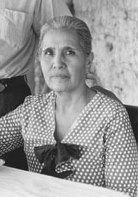María G. Sada

María G. "Chata" Sada (December 5, 1884 - July 13, 1973) was a Mexican-American businesswoman, informal educator and midwife in Boquillas Canyon.[1] Sada ran the last store and restaurant in the Boquillas area, "Chata's Place" between 1901 and 1936. Eventually the land it stood on became part of the Big Bend National Park.
Biography
[edit]
Sada was born in Iraxuato, Guanajuato.[2] "Chata" is a nickname meaning "flat nose" or "cute."[3] She was raised in the Big Bend area of Mexico.[4] Sada and Juan Sada moved to the Boquillas area in the 1880s and got married in 1901.[5] The couple never had children, but adopted and fostered many children who needed homes.[5] None of the children the Sadas raised were officially adopted, but were cared and look after according to Mexican custom.[3] After securing a permanent visa, she moved to the Texas side of the Rio Grande where she and her husband built an adobe house that became a general store and cafe.[5]
Sada was in charge of the business, known as "Chata's Place," because her husband ran a silver mine in Coahuila.[6][7] In order to improve business, Sada learned English so she could better serve various people who came to Big Bend.[6] Sada even cashed checks for her customers and kept beer cold in a "kerosene-powered refrigerator."[6] Visitors to the area could lodge at Chata's Place.[2] She also prepared food for travelers.[3] Sada was considered an excellent shot, and had protected her livestock from mountain lions and rattlesnakes.[4] In addition to running the store and restaurant, she also started teaching and acting as the local midwife for people in both Texas and Mexico starting in the 1920s.[8] In the late 1930s, Sada and her husband had the only store in Boquillas.[9]
Juan Sada died on December 24, 1936, and eventually Maria Sada closed down the business and moved to Del Rio a few months after.[5] After she left, Big Bend National Park removed Chata's Place.[10] In Del Rio, Sada lived with one of her sons.[6] On July 7, 1960, she was invited to a ceremony at Big Bend National Park where she was greeted and remembered by the community.[2]
Sada died on July 13, 1973.[2] Funeral rites were held on July 15 at St. Joseph's Catholic Church in Del Rio.[11]
References
[edit]Citations
[edit]- ^ Acosta & Winegarten 2003, p. 319.
- ^ a b c d Orozco, Cynthia E. (15 June 2010). "Sada, María G." Handbook of Texas Online. Texas State Historical Association. Retrieved 23 September 2017.
- ^ a b c "Geology, Place Names, and Legends". National Park Service. Retrieved 2017-09-23.
- ^ a b McCormick, Harry (1933-07-14). "Rancher Matches Skill with Bandit in Vengeance Plot". Hope Star. p. 3. Retrieved 2017-09-23 – via Newspapers.com.
- ^ a b c d "Chata Sada". National Park Service. 18 September 2017. Retrieved 2017-09-23.
- ^ a b c d Orozco, Cynthia E. (2006). "Sada, Maria G. "Chata" (1884-1973)". In Ruiz, Vicki L.; Korrol, Virginia Sánchez (eds.). Latinas in the United States, set: A Historical Encyclopedia. Indiana University Press. p. 652. ISBN 0253111692.
- ^ Aulbach, Louis F. (2007). The Great Unknown of the Rio Grande. Louis F. Aulbach. p. 28. ISBN 9780976521358.
- ^ Acosta & Winegarten 2003, p. 97.
- ^ "No Spik Inglis". Valley Morning Star. 1937-03-07. Retrieved 2017-09-23 – via Newspapers.com.
- ^ Baker, T. Lindsay (2005-08-01). More Ghost Towns of Texas. University of Oklahoma Press. p. 15. ISBN 9780806137247.
- ^ "Mrs. Maria Sada Rites Today at 4". Del Rio News Herald. 1973-07-15. Retrieved 2017-09-23 – via Newspapers.com.
Sources
[edit]- Acosta, Teresas Palomo; Winegarten, Ruthe (2003). Las Tejanas: 300 Years of History. Austin, Texas: University of Texas Press. ISBN 9780292747104.
